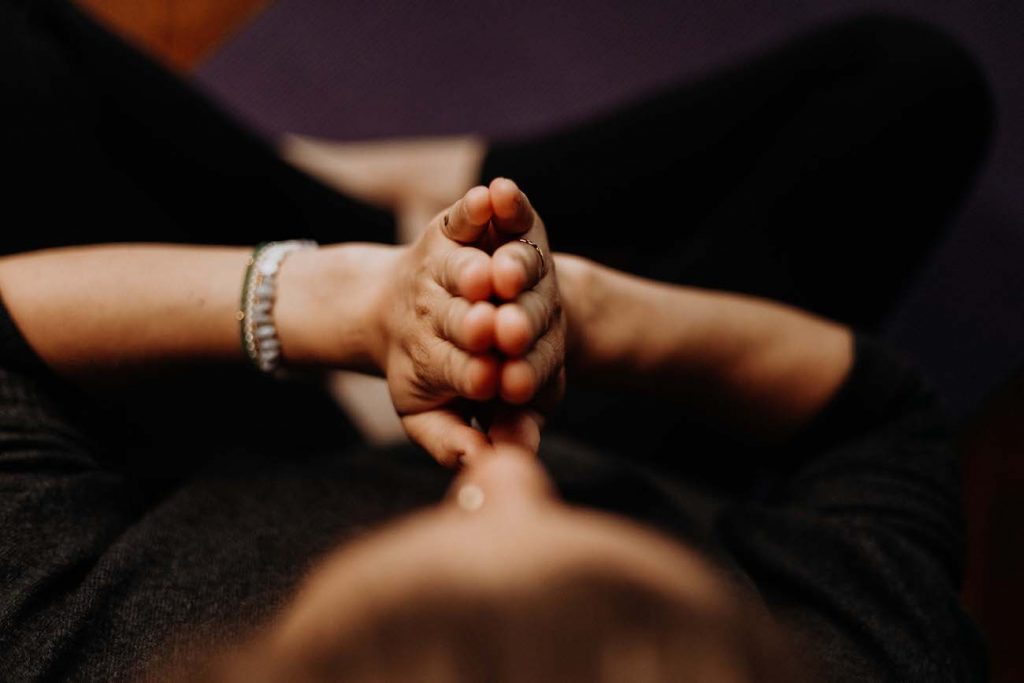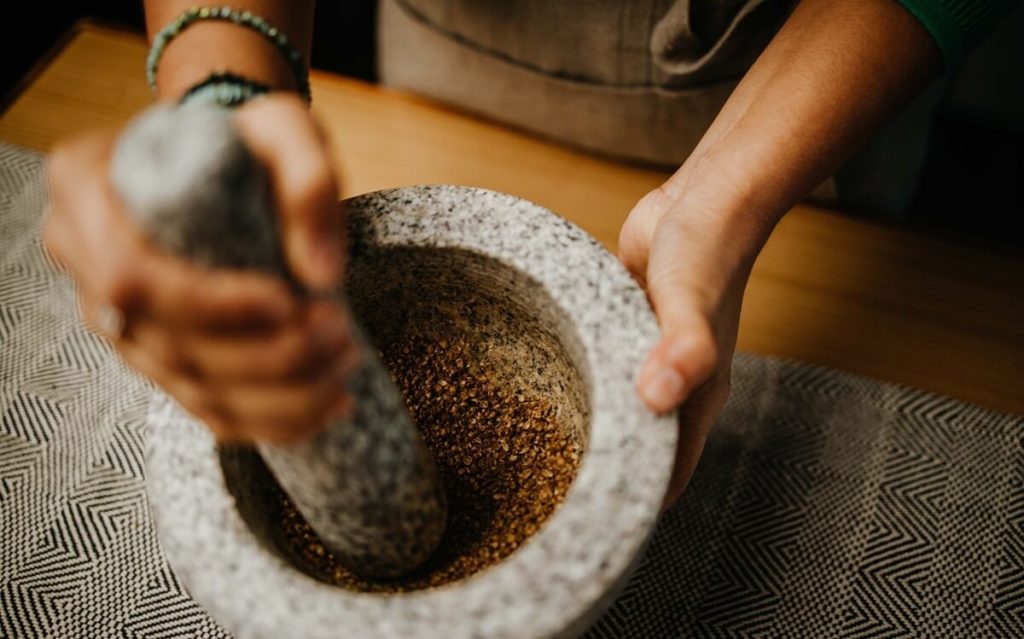Tinnitus is an annoying symptom that indicates a dysregulation or disease in the ears. Ringing or whistling noises in the ears make everyday life difficult for those affected. Find out more about the causes and symptoms as well as the role Ayurveda plays in tinnitus in this article .
The most important facts in brief: Treating tinnitus in Ayurveda
The Ayurvedic treatment approach for tinnitus reaches deep into your body and aims to alleviate the symptoms in the long term. In addition to Ayurvedic massages, a dosha-appropriate diet and more rest in everyday life also help in Ayurveda.
Tinnitus: causes and symptoms
Although the causes of tinnitus are varied and can have different triggers, most sufferers show similar symptoms. It is important to act quickly if tinnitus is suspected.
Causes of tinnitus: Ayurvedic approach
Despite its numerous causes, tinnitus often occurs in combination with hearing loss. The ear transmits too few sounds to the central auditory center. The brain then tries to compensate for this missing information.
It then amplifies disturbing noises from the nerve cells that are normally suppressed or not perceived. Tinnitus is therefore primarily an expression of dysregulation.
Other factors such as stress, overwork and psychological problems such as depression and anxiety can also exacerbate the ringing in the ears. Emotional stress is often the main trigger for tinnitus, especially in the case of acute complaints.


Due to the numerous factors that can cause tinnitus, a comprehensive examination is advisable. It is best to have your complaints clarified if there are any indications of tinnitus:
- Excessive earwax
- Malfunctions of the tube ventilation
- Diseases of the middle ear (e.g. otosclerosis)
- Diseases of the inner ear (e.g. age-related hearing loss)
- sudden deafness
- Noise or blast trauma
- Diseases of the auditory nerve (e.g. acoustic neuroma or vestibular schwannoma)
- Tumors on the auditory nerve
- Problems in the dental/jaw area
- Injuries or changes to the cervical spine
In order to be able to treat your complaints with the Ayurvedic healing approach, the composition of your constitution is crucial. Based on the distribution of your doshas and their (im)balance, you will receive an individual treatment.


Determine your Ayurveda type with our Dosha test
Determining the doshas is a central area of Ayurvedic healing and life science. Take the Dosha test now and determine your Ayurveda type!
In Ayurveda, the ear and the sense of hearing are assigned to the dosha Vata. A disturbance of Vata - together with a general imbalance of body and mind - can lead to tinnitus. An unhealthy lifestyle, nervous overload and an irregular diet promote ringing in the ears.
Vata is characterized by the element air, which means that the factors mentioned can lead to a drying out of the tissue. This dryness can ultimately affect the ear canals in the ear, where blockages can form. Noises in the ear can therefore be an indicator of a malfunction in your body.
Recognizing symptoms of tinnitus
The best-known symptom of tinnitus is a persistent noise in the ear. This can be a whistling, hissing, hissing or humming. The ringing in the ears can affect one or both ears.
Some sufferers also complain of hearing noises in their head. What do all patients have in common? Tinnitus can only be perceived by those affected. Nevertheless, it is a serious symptom.


The severity of the noises and their volume and intensity vary depending on the patient. An extremely rare form of tinnitus is so-called "objective tinnitus", which is audible to outsiders. This requires special treatment.
Depending on the severity of the tinnitus, a distinction is made between two types:
- Compensated tinnitus: no complaints due to the ringing in the ears
- Decompensated tinnitus: extreme suffering, impairment of quality of life
There are further gradations between these two forms. This classification is particularly important for the correct treatment approach.
Treating tinnitus with Ayurveda
Where conventional medicine is at a loss, Ayurvedic teachings with their holistic therapy concept come into play. Instead of medication, Indian science is based on alternative healing approaches. A lot revolves around the balance of your doshas.
A first step is an Ayurvedic diet to balance the Vata imbalance in your body. A diet plan with foods that reduce Vata is crucial for long-term recovery.
In addition to the right diet, your lifestyle also plays an important role. Do you suffer from a lot of stress or are you constantly exposed to loud noises? These factors are also taken into account when treating your tinnitus.


Stress management with Ayurveda: definition and methods
What is stress and what can you do about it? Here you will find valuable tips and methods for effective stress management with Ayurveda.
Traditional Ayurvedic treatments and massages with herbal oils ensure a deep cleansing of your body. This also helps your doshas to regain their balance and has a positive effect on your whole body.
By incorporating relaxation exercises into your everyday life, you also help your body to calm down. These include meditation, yoga and breathing exercises as well as active, conscious rest breaks.
5 tips for treating tinnitus with Ayurveda
In addition to tablets and conventional medicine, the alternative healing approaches of Ayurveda can provide reliable relief from tinnitus.


Tip #1: Ayurvedic nutrition
An important pillar of the Ayurvedic way of life is the Dosha-appropriate Ayurvedic diet. Here, attention is paid to balancing your constitution and nourishing your body and mind in a healthy way.
As increased Vata is considered a cause of tinnitus from an Ayurvedic perspective, it is important to eat a Vata-reducing diet. For example, you should avoid dry, cold and uncooked foods. Instead, warm and moist dishes will alleviate your symptoms.
In addition, try to keep your consumption of alcohol, caffeine and nicotine as low as possible.
Tip #2: Ayurvedic cures and massages
Ayurvedic cures and massages also make a major contribution to more relaxation and rest for your body. Various detoxification methods help with ayurvedic detoxification of your body.
Healing oils and Ayurvedic herbs are used for the massages. Ayurvedic herbs with special properties are used. Relax during a soothing massage and let your thoughts come to rest for a while. You will notice that afterwards you will go through life feeling invigorated and refreshed.
Ayurvedic foot massages or head massages are a good option for self-massage, especially for regulating Vata. Simply massage your scalp and the soles of your feet with warm oils before going to bed.
Tip #3: Vata-reducing herbal preparations
In addition to a dosha-appropriate diet, herbal preparations help to treat your tinnitus.
The well-known medicinal herb ashwagandha is central to the treatment of your symptoms. The stress-reducing effect of the herb reduces Vata and thus helps to alleviate tinnitus symptoms.
Another important herb is guduchiwhich is said to balance all doshas. It also helps in the treatment of tinnitus and the regulation of vata.
Processed as juice, grapes have a supportive and strengthening effect on tinnitus. The bitter fenugreek seed tea is also a well-known remedy for troublesome ringing in the ears.


Discover fenugreek seeds in the European Ayurveda® online store
Fenugreek seeds are an ideal spice for bean and cabbage dishes, but can also be infused as a tea. They are known to cleanse the liver and gall bladder and stimulate fat metabolism.
Tip #4: More mindfulness and less stress
Conscious mindfulness is required to help your body achieve greater calm and reduce stress. Try to reduce your everyday stress as much as possible and build up a positive mindset.


Meditation, breathing exercises or yoga can help. Try to integrate the exercises into your everyday life and make them a fixed ritual. The positive side effects also include improved sleep quality and calmer nerves.
Tip #5: Gargle regularly
Tinnitus in your ear is directly related to the nasopharynx. You can reduce excess Vata by integrating the following practices into your daily life:
- Kawala describes regular gargling with medicinal oils or salt water
- Gandusha is understood to mean oil pulling with an oral care oil
With these two tips you can get relief from persistent ringing in the ears.


Ayurveda for migraines: 5 tips against headaches
Migraines are usually characterized by one-sided, pulsating or hammering pain. You can find out how Ayurveda helps with migraines in this article.




